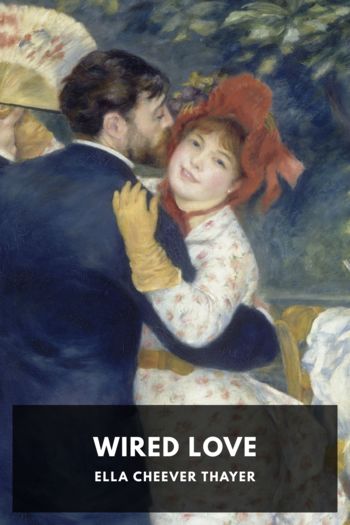Wired Love - Ella Cheever Thayer (best classic books of all time .txt) 📗

- Author: Ella Cheever Thayer
Book online «Wired Love - Ella Cheever Thayer (best classic books of all time .txt) 📗». Author Ella Cheever Thayer
“What nonsense!” murmured Nattie, laughing to herself; but’ she put the picture away in her writing desk as carefully as she might some cherished memento.
V Quimby Bursts Forth in Eloquence“That young lady over there acts very strangely. She is not crazy, is she?” inquired a gentleman who stood leaning against the counter over the way, and looking across at Nattie.
“I don’t know what to make of her,” the previously mentioned clerk, to whom this question was addressed, answered, “I have been observing her for some weeks; she sits half the time as you see her now, laughing to herself and gesticulating. Sometimes she will lean back in her chair and absolutely shake with laughter, and she smiles at vacancy continually. She seems all right enough with the exception of these vagaries. But she is a perfect conundrum to me.”
“A bit loony, I think,” said the gentleman, who had asked the question.
Just then, Nattie, who, of course, was talking to C, and telling him about that sketch—with the slight reservation of the Cupid—happened to look up, with her gaze seventy miles away; but becoming aware of the curious stares of the two gentlemen opposite, her vision shortened itself to near objects, and rightly surmising from their looks the tenor of their thoughts, she colored, and straightway turned her back, at the same time informing C of what she termed their impertinence. But C answered, with a laugh,
“It cannot but look strange, you know, to outsiders, to see a person making such an ado apparently over nothing. Put yourself, if you can, in the place of the uninitiated; you come along, see an operator quietly seated, reading the newspaper, with his feet elevated on a chair or table, the picture of repose. Suddenly up he jumps, down goes the paper, he seizes a pencil, hurriedly writes a few words, frowns violently, pounds frantically on the table, stares savagely at nothing, bursts suddenly into a broad smile, and then quietly resumes his first position. Wouldn’t these seem like rather eccentric gambols to you, if you didn’t know their solution?”
“Ha! Doubtless,” answered Nattie. “So I suppose I must forgive my observers, and be more careful what I do in future. I have no doubt I often make myself ridiculous to chance beholders, when I am talking with you.”
“I wonder if that is complimentary to me?” queried C.
“Certainly, as it is because you make me laugh so much,” Nattie replied.
“Then I am not such a disagreeable fellow as I might be?” demanded C, evidently attempting to extort flattery.
But before Nattie could answer, someone else opened their key, and said,
“Oh, yes you are!”
“That was not I,” Nattie explained, as quickly as possible. “Some of those unpleasant people that can’t mind their own business. I was about to say I should not know how to get through the days now, if I hadn’t you to talk with.”
“Do you really mean it?” questioned C, delightedly, it is reasonable to suppose. “Truly, I was thinking only last night how unbearable would have been the solitude of my office, had I not been blessed with your company. I was lonesome enough before I knew you, but I never am now.”
It was a pity that no telegraphic instrument had yet been invented that could carry the blush on Nattie’s cheeks for his eyes to see, because it was so very becoming. She commenced a reply, expressing her pleasure, but was unable to finish it, on account of that unknown and disagreeable operator somewhere on the line, who kept breaking the circuit after every letter she made. Nor was C allowed to write anything either. This was a trick by which they had often been annoyed of late.
For, on the wire in the telegraphic world, as well as elsewhere, are idle, mischief-making people, who cannot endure to see others enjoying themselves, if they also have no share.
Thus, unable to talk farther at present with her indefatigable conversationalist, Nattie took up a pencil and began entering the day’s business in her books, when a shadow darkened the doorway, and she looked up to see Quimby.
Since the evening of the card party, when he had become so fully conscious of the condition of things inside his heart, Quimby had been in a really pitiable state of unrest. Too bashful, or too deficient in self-confidence to seek the society of her who was the cause of all his uneasiness, as his inclinations directed, and not knowing how to make himself as





Comments (0)